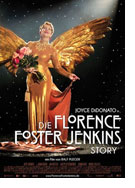

Opening 10 Nov 2016
Directed by:
Ralf Pleger
Writing credits:
Ralf Pleger
Principal actors:
Joyce DiDonato, Adam Benzwi, Jan-Philipp Rekeszus, Lars-Peter Schmädicke, Jasmin Antic
Writer-director Ralf Pleger’s documentary stylistically matches the flamboyance of its protagonist. A historian, architect, musicologist, archivist, acquaintances, Bayfield’s second wife, Florence’s accompanist Cosmé McMoon’s 1954 radio interview, and supporting/mood-setting archival footage convey, “It’s a damn good story.”
Narcissa Florence Foster, born to wealthy parents in Pennsylvania, knew by age seven public performing was her passion; piano was her forte. Lacking ability as a violinist, she was forbidden practicing at home. As retribution for her father’s controlling stinginess, the young socialite eloped in 1855, then a year later left Dr. Jenkins and heads to New York City around 1900. In 1909, Florence meets St. Clair Bayfield, a British actor 16-years younger. A handsome escort, he lends respectability to her career, which she earnestly pursues after her father’s death that year, i.e. trust beneficiary. Their sadomasochist relationship cum common-law marriage lasts until her 1944 death. Engaging in N.Y. society, Florence joins numerous social clubs as an avenue to presenting, and starring in lavish tableaux vivants, popular with N.Y. moneyed. Her eye-catching dress—on and off stage—is “… good camp, hi-camp”; “people were craving originality.” Private vocal recitals singing soprano opera, i.e. respectable, ensue in 1912 although she is oblivious to her pitch. Florence establishes the Verdi Club in 1917, and membership swells. Next, Carnegie Hall! “The old lady had a lot of vitality.”
Laced with reenactments, beginning with a 1944 interview on the eve of her grand Carnegie Hall debut, American opera singer Joyce diDonato giftedly plays Florence. McMoon explains in 1954, “She didn’t hear her pitch… instead of laughing, (audiences) burst in to salvos of clapping, etcetera, so (they) could laugh.” Pleger and editor Frank Tschöke have assembled a hybrid-documentary, i.e., a very clever, creative, and sophisticated mix of style applications. Complete with complementary camerawork (Christoph Valentien), and set designs (Daria Kornysheva). Achieving a distinct place in opera, the film is a brilliant counterpart to Florence, “a genius in her own time.” (Marinell Haegelin)